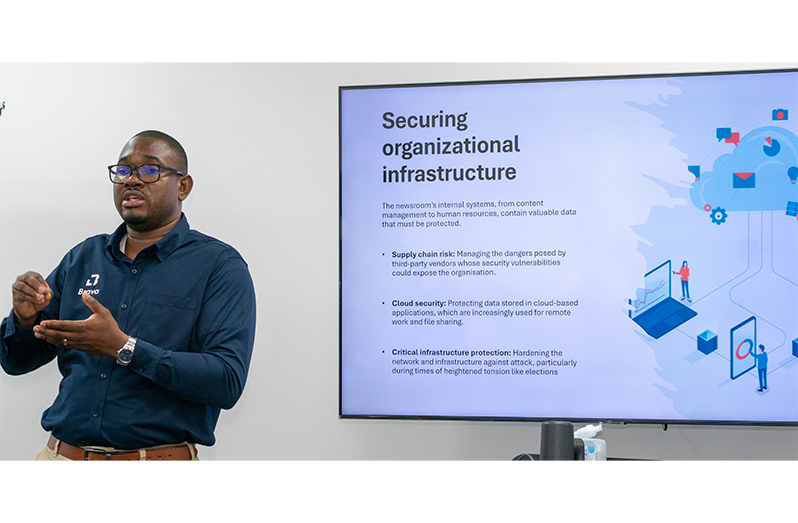JOURNALISTS face growing cybersecurity threats in the digital era, with sensitive information, sources, and personal data increasingly at risk. This was highlighted during a recent training session hosted by Brava, the business arm of One Communications, where cybersecurity analyst Cloyd London emphasised the growing importance of protecting data while maintaining integrity and accessibility, especially for media operatives.
The session underscored practical steps journalists and everyday users can take to safeguard information, protect their digital footprint, and maintain professional and personal safety.
Speaking to a number of Guyanese journalists and media operatives, London explained that while cybersecurity is important for everyone, strong protection for journalists is vital, noting the responsibility they have to ensure the information they handle is accurate and accessible.
“What is more important is that you guys have a mandate to make sure that every citizen within the country or regionally, nationally, internationally, have access towards that information.”
He added, “However, there’s a key component that needs to be done. Protecting data while maintaining integrity and availability. The most important part is that the information that you guys hold, as you do your research and you process that information, and then you create an article and then you present it to the press…you want to make sure integrity is there.”
Beyond reporting, journalists must ensure the security of data stored on phones, computers, servers, and even at media houses before publication. Despite advanced IT infrastructure, the human element often remains the weakest link in cybersecurity, reinforcing why journalists are often targeted and are at higher risk of being hacked.
As London pointed out, “In the field of cybersecurity, the business side of things is that having the most robust IT infrastructure, software, and hardware, and that’s about it. It means that my business is secure. But over the years, the weakest link for any form of cybersecurity breach is us. The human element, because we are the weakest link.”
Mistakes such as using weak passwords or oversharing personal details online can leave journalists vulnerable to attacks, he warned. Hackers frequently exploit human behaviour through social engineering, asking indirect questions to gain direct answers, he explained.
Social media was flagged as a key source of risk. While social media is a means of community and connection, London warned against oversharing and urged due diligence in publicising information.
“TikTok, WhatsApp, Facebook, Instagram, and all the other stuff. We post so much information out there, content, content, content, posting, posting. But actually, as a hacker, what they’re doing, they’re actually analysing the trends. This is what hackers do,” he said.
Hackers can track users’ activity and even study friends’ online behaviours to access information, a process known as reconnaissance. London urged journalists to exercise caution when sharing personal content online, stressing that simple precautions can prevent data exposure.
The session also covered techniques hackers use to breach systems, from observing PINs at entry points to creating enticing files that, when opened, instantly compromise devices.
“Just like that, within five seconds, I have access into your system,” London said, describing how phishing attacks target those seeking timely information. Journalists were reminded that digital risks extend beyond data loss to personal safety. London explained that moving from analogue typewriters to digital systems increased convenience but also exposed reporters to greater threats. Compromised systems can reveal confidential sources, destroy trust, or disrupt news operations. Advanced spyware, he noted, can bypass even encrypted devices, tracking every conversation and activity in real time.
The session concluded with practical advice for both journalists and everyday Guyanese to safeguard their digital presence. London emphasised simple measures such as using strong, unique passwords, being cautious about the information shared on social media, and verifying the authenticity of files and links before opening them.


.jpg)











